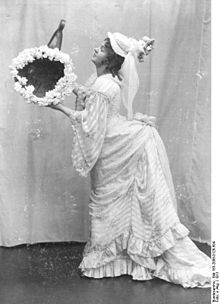Leopoldine Konstantin


Leopoldine Eugenie Amelie Konstantin (born March 12, 1886 in Brno , † December 14, 1965 in Vienna ) was an Austrian actress .
Life
Her father was Michel Constantin, who in 1890 was editor of the Modern Poetry published by Eduard Michael Kafka (son of Maria Constantin) .
She took private acting lessons from Alexander Strakosch (1846–1909), whom she married shortly afterwards, and made her debut in 1907 with Max Reinhardt at the Deutsches Theater in Berlin. She embodied Thea in Frank Wedekind's Spring Awakening (1907), the pages in Shakespeare's Romeo and Juliet (1907), Perdita in A Winter's Tale (1908) and Puck in A Midsummer Night's Dream (1910).
From 1911 she could also be seen at the Berliner Kammerspiele and became a well-known personality at the Berlin salons . During the First World War she moved to Vienna in 1916, where she appeared - sometimes compared to Helene Odilon - at the Stadttheater Wien , the Theater in der Josefstadt and the Deutsches Volkstheater . She portrayed typical Grande Dames here , and she was particularly successful in 1924 at the Volkstheater in the title role of Friedrich Schiller's Maria Stuart .
Since 1912 she took part in silent films, initially in leading roles. When she increasingly had to make do with supporting roles after the First World War, she turned away from this medium for some time. In 1923 she built a house for herself and her son Alexander in Westerland , and in 1924 she married the Hungarian ministerial advisor and author Géza Herczeg .
From 1933 she resumed her film work, and in 1935 she returned to Austria. Divorced in the meantime, she emigrated to England in 1938. After losing her son in a bombing raid on London, Konstantin moved to the United States. Since she spoke only very poor English, she first had to make ends meet as a factory worker until, after intensive language studies, she was given a major supporting role in Alfred Hitchcock's Infamous in 1946 as the possessive mother of a Nazi sympathizer ( Claude Rains ). When asked why she only made this one Hollywood film despite good reviews, she replied: "My very first part and they made me in this monster!"
Until 1957, Leopoldine Konstantin took part in three episodes of largely forgotten American television series. She returned to Austria in 1948, but was unable to build on her earlier successes. Only occasionally did she work in German theaters or take part in readings for the radio.
Leopoldine Konstantin last lived with her adopted daughter Elisabeth Herczeg in Vienna's Trauttmansdorffgasse ; she died of cardiac arrest on December 15, 1965 and was laid to rest in the Vienna Central Cemetery ( Evangelischer Friedhof Simmering) .
Filmography (selection)

- 1910: Sumurun
- 1912: Banned and redeemed
- 1912: The hand of fate
- 1912: The heroine of the black mountains
- 1913: father and son
- 1913: Ultimo
- 1913: The island of the blessed
- 1913: guilty
- 1914: Little white slaves
- 1914: The broken doll
- 1915: The lullaby
- 1915: the dancer
- 1917: From forgotten files
- 1917: One night in the steel chamber
- 1917: The onyx button
- 1918: Lola Montez
- 1919: The volunteer
- 1919: The betrayal of Countess Leonie
- 1919: can thoughts kill?
- 1920: The Shawl of Empress Catherine II.
- 1920: President Barrada
- 1920: world fire
- 1921: The Silver King
- 1933: Season in Cairo
- 1933: Something happens at midnight
- 1934: Csibi, the face
- 1934: Dear stupid mom
- 1934: Princess Turandot
- 1934: The old and the young king
- 1935: A breath of fresh air from Canada
- 1936: girls' boarding school
- 1937: And you, my darling, are going with me
- 1937: Different world
- 1946: Notorious (Notorious)
- 1950: The American (episode Philco Television Playhouse) (TV)
- 1950: The Swan (episode of the Actor's Studio) (TV)
- 1957: Victoria Regina (episode from Robert Montgomery Presents) (TV)
literature
- Kay Less : "In life, more is taken from you than given ...". Lexicon of filmmakers who emigrated from Germany and Austria between 1933 and 1945. A general overview. ACABUS-Verlag, Hamburg 2011, ISBN 978-3-86282-049-8 , p. 282 f.
Web links
- Leopoldine Konstantin in the Internet Movie Database (English)
- Biography with photo
- Further biography with photo
- Entry on Leopoldine Konstantin in the Austria Forum (in the AEIOU Austria Lexicon )
- Pictures by Leopoldine Konstantin In: Virtual History
- Radio report with Leopoldine Konstantin in the online archive of the Austrian Media Library
Individual evidence
- ↑ According to aeiou : December 15.
- ^ Austrian National Library: ANNO, Arbeiter Zeitung, 1916-10-06. Retrieved May 30, 2017 .
- ^ Raoul Auernheimer : Leopoldine Konstantin. In: Neue Freie Presse , Morgenblatt (No. 18715/1916), September 27, 1916, p. 1 ff. (Online at ANNO ).
- ^ Leopoldine Konstantin. Retrieved February 23, 2017 .
- ↑ a b Kay Less : “In life, more is taken from you than given…” Lexicon of filmmakers who emigrated from Germany and Austria 1933 to 1945. A general overview . 1st edition. Acabus-Verlag, Hamburg 2011, ISBN 978-3-86282-049-8 , p. 283, text online .
- ^ Leopoldine Konstantin . (English). In: findagrave.com , September 25, 2006; Retrieved February 24, 2012.
| personal data | |
|---|---|
| SURNAME | Konstantin, Leopoldine |
| ALTERNATIVE NAMES | Konstantin, Leopoldine Eugenie Amelie (maiden name) |
| BRIEF DESCRIPTION | Austrian actress |
| DATE OF BIRTH | March 12, 1886 |
| PLACE OF BIRTH | Brno |
| DATE OF DEATH | December 14, 1965 |
| Place of death | Vienna |